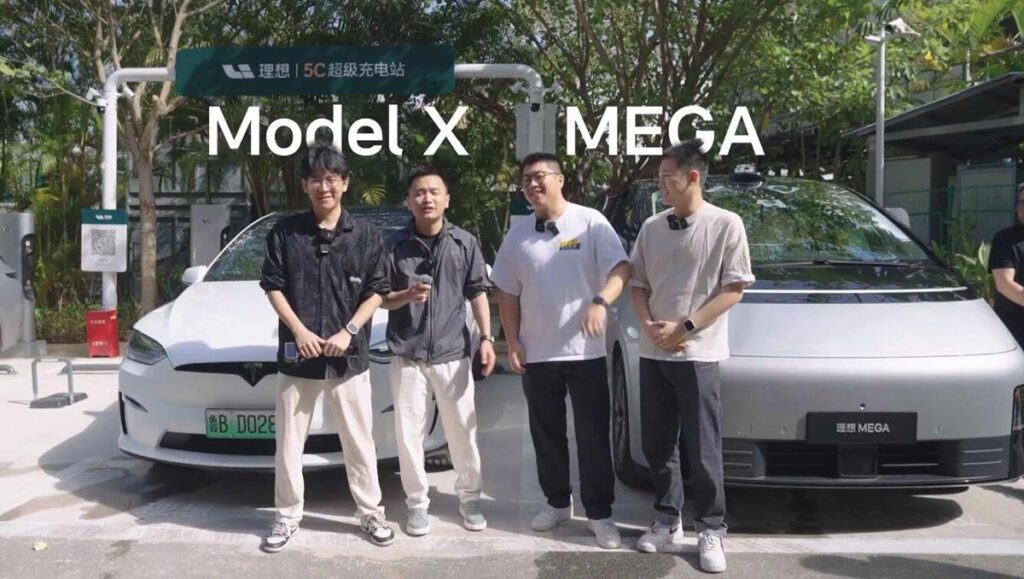Li Auto released a range test comparison video of the Li Mega versus the Tesla Model X to show that its first BEV model has better performance.

(A screenshot from the video Li Auto posted of Li Mega’s range comparison test of the Tesla Model X.)
Tesla (NASDAQ: TSLA) mocked Li Auto (NASDAQ: LI) on social media about a month ago for having no real technology and relying on superficial comfort features to attract customers.
Now the Chinese extended-range electric vehicle (EREV) maker is firing back.
Li Auto today posted a video on its Weibo account challenging Tesla’s Model X SUV in a range test with its yet-to-be-formally-launched first battery electric vehicle (BEV) model, the Li Mega MPV (Multi-Purpose Vehicle).
“Not long ago, Tesla’s official Douyin account implicitly mocked Li Auto’s refrigerators, color TVs, and big sofas as ‘superficial decoration,’ and that one should buy an EV for the ‘invisible smart manufacturing’ (batteries, motors, and electronic controls),” Li Auto wrote on Weibo.
“So we decided to do a fair and impartial technical PK, challenging the Tesla Model X with the Li Mega. Both models have a battery capacity of around 100 kWh and a CLTC range of around 700 km,” Li Auto said.
The test was conducted by four car bloggers, two of whom are Tesla owners, including a new Model X owner.
The Li Mega and Model X used for the test are both dual-motor all-wheel-drive models, with the former having a battery pack capacity of 102.7 kWh and the latter 99.6 kWh.
The Li Mega weighs 2,785 kg and the Model X 2,373 kg, and they have drag coefficients of 0.215 and 0.24 respectively.

Even though the Li Mega is an MPV, its unique design that resembles a Chinese high-speed rail locomotive helps it achieve a lower drag coefficient.
The test was conducted in Hainan, China’s southernmost province, where the current higher temperatures are favorable for EV range.
As of this writing, the real-time temperature in Hainan is around 16 degrees Celsius, compared to about 4 degrees Celsius in Beijing, where Li Auto is headquartered.
The planned test distance was 616 kilometers, and both the Li Mega and Model X actually drove 547.2 kilometers.

At the end of the test, the Li Mega had 14 percent of its battery remaining, meaning it could actually achieve a range of 636 kilometers, or 89.6 percent of its claimed range.
The Tesla Model X had 4 percent charge remaining, meaning it could achieve a real-world range of 570 kilometers, 81.4 percent of the claimed range.
The average energy consumption per 100 kilometers for the Li Mega and Model X is 15.9 kWh and 15.8 kWh, respectively, according to data published by Li Auto.

The charging speeds of these two cars were also compared. The Li Mega can be charged from 5 percent to 80 percent in 11 minutes when using Li Auto’s 5C charging pile. The Model X takes 30 minutes to charge from 5 percent to 80 percent when using Tesla’s V3 Supercharger.
On December 29, Tesla posted a short video on Douyin titled “What to look for when buying an EV,” mocking the refrigerators, color TVs, and large sofas that come with some models as superficial decoration.
Tesla didn’t directly mention Li Auto at the time, but it’s the most well-known Chinese automaker to have a refrigerator, sofa, and TV in its cars.
The short video also implied that the safety of Li Auto’s vehicles is only marketing, while the safety of Tesla’s vehicles is real, and included a personal photo of what is suspected to be Li Auto CEO Li Xiang with his head covered.

Tesla’s short video sparked some local media coverage at the time, and Li Auto’s legal department retweeted a story on Weibo at the time, but did not make any comments.
Tesla then quickly deleted the short video.
Li Auto’s three models currently on sale are the Li L7, Li L8, and Li L9, all of which are EREVs, essentially plug-in hybrids.
The company plans to officially launch the Li Mega on March 1 and will start deliveries soon after that. It had planned to launch the Li Mega in December.
Tesla has a plant in Shanghai that produces the Model 3 and Model Y. The more expensive Model S and Model X are not produced in China.

